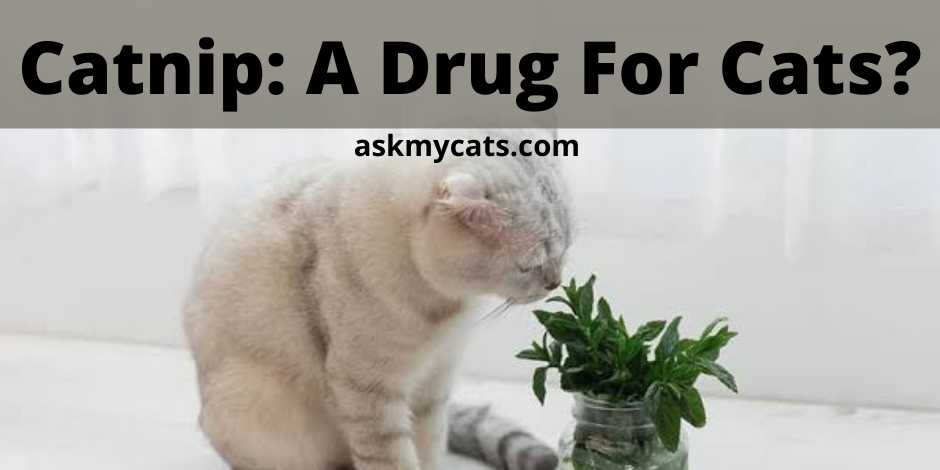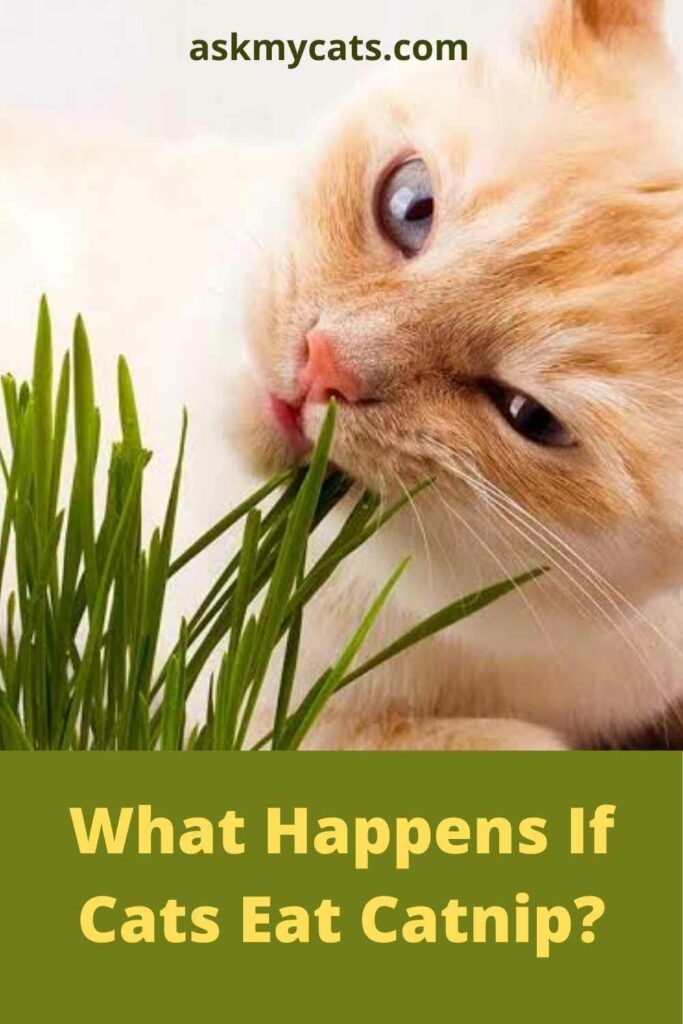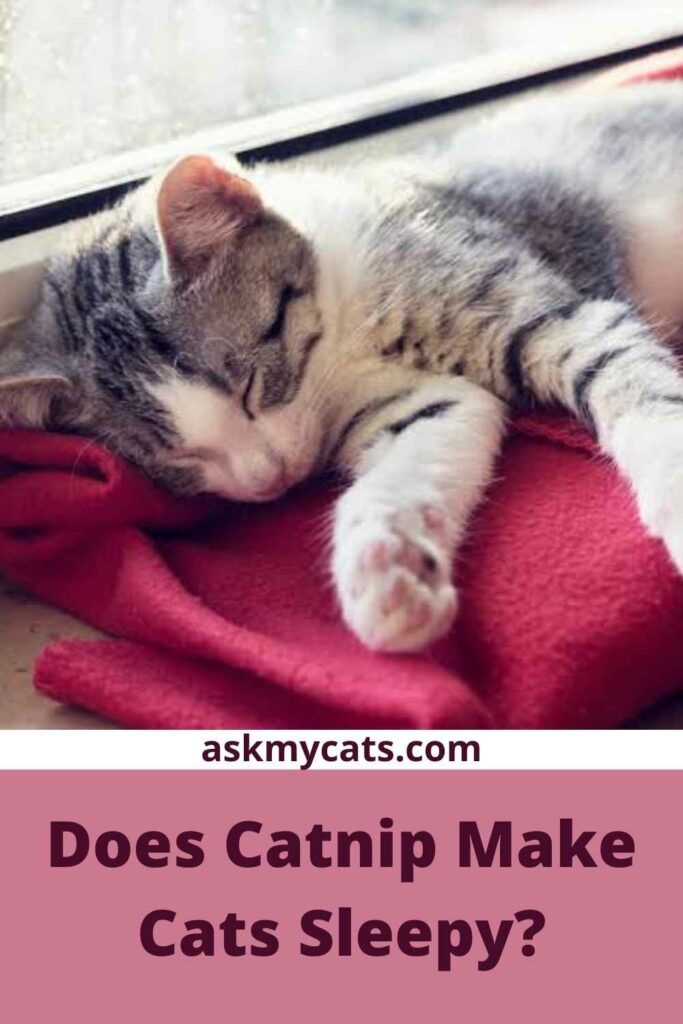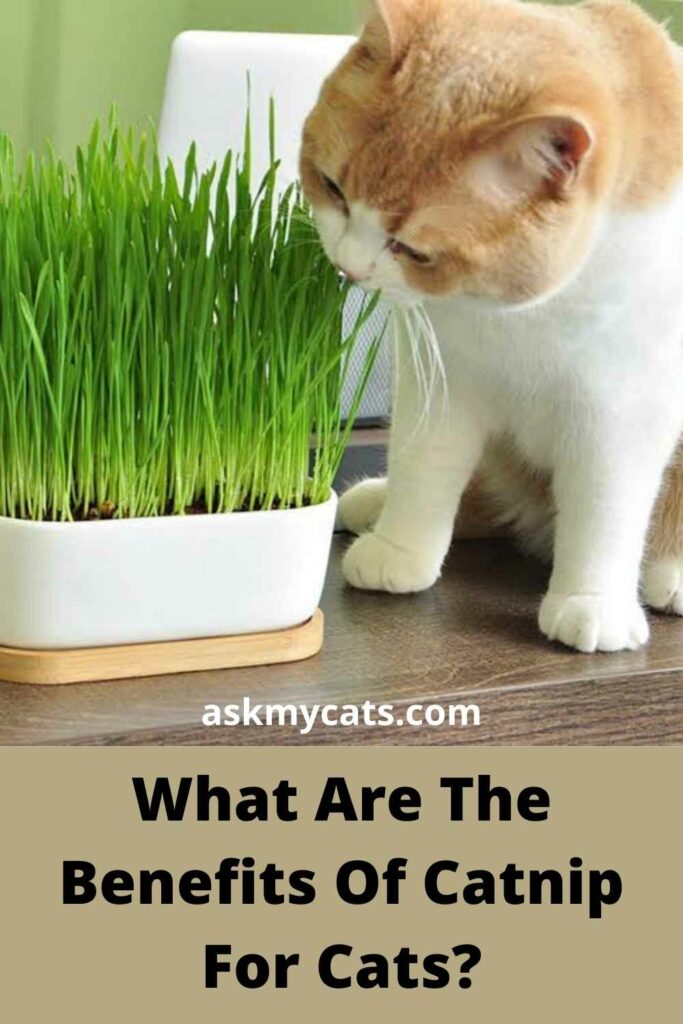You can tell if your feline has just sniffed or eaten catnip. She licks, sniffs, and shakes her head for approximately ten minutes before returning to her regular self.
While you’re delighted to see your cat in a euphoric condition, you may have questions like: Is Catnip a drug? How much catnip should I give my cat?
Don’t worry, we’re here to answer all of your doubts and questions.
The mint plant Nepeta cataria, popularly known as catnip, is a member of the mint family. Catnip plants are distinguished by their green leaves with jagged edges and off-white to lavender-colored blooms that emerge in late spring.
Nepetalactone, a volatile oil found in its stems and leaves, is the cause of your cat’s odd behavior.
Although it’s clear that your cat is having a good time, catnip high is not the same as human drug usage and addiction. Catnip isn’t a drug because it doesn’t cause your cat to have hallucinations. They’re conscious of what’s going on around them.
The behaviors that a cat exhibits after sniffing catnip persist for around 10 minutes until they fade away. If you want to learn more about catnip and its relationship with your feline, keep reading!


Give Your Cat the Perfect Day
Get the Free Ebook!
What Happens If Cats Eat Catnip?

The presence of nepetalactone in the cat’s olfactory epithelium activates the inner part of her nose. The cat may get eager to chew or lick the catnip as a result of this.
After ingesting catnip, your cat might even lie down and turn over a few times. The effects of catnip usually take a minute or two to take effect.
Your cat will purr and be pleased during this period, but will also become weary and slobber. If they don’t fall asleep right away after sniffing or eating the catnip, they may bounce around for a while before falling asleep.
Be warned that when they sniff catnip, some cats aren’t always so friendly. Because catnip causes anxiety in certain felines, your four-legged companion may appear anxious rather than loving during these times.
If you give them catnip by hand, they may bite or scratch you. As a result, it’s better to leave catnip on the floor or in a toy and keep your hands away from it.
You might notice the following in your feline friend after it has eaten catnip:
- Purring
- Dilated pupils
- Drooling
- Rolling around in catnip
- Increased anxiety
- Aggression
Is Catnip Bad For Cats?
Catnip has no ingredients that are harmful to your cat. If your cat consumes too much catnip, the sole risk is that it will have an upset stomach.
Apart from that, there’s no need to be concerned about catnip being harmful to cats. Cats adore this non-addictive, non-toxic plant from the mint family.
The effects last about five to fifteen minutes. Catnip is safe for your cat if used in moderation. It shouldn’t matter if they chew and swallow some leaves.
Is Catnip Bad For Kittens?
Catnip is safe for all ages of cats, even kittens. In young cats, however, you should not expect the same outcomes. In fact, the fragrance of the plant may first deter a kitten.
Catnip sensitivity does not emerge until the cat reaches sexual maturity. This usually takes around six months.
When a young kitten develops a sensitivity to catnip, she will become interested in the herb and things laced with the herb’s oil.
To begin, offer your cat a little quantity of catnip, such as a small sprinkle of flakes or a small dab of oil on his favorite toy. Make sure you keep a careful eye on your cat.
When left unattended, new catnip users might get rowdy and injure themselves.
As your cat gets older, you’ll notice that she doesn’t seem to like catnip as much as she used to. Older cats may even despise catnip. Do not be alarmed as this is very natural for cats.
Can Cats Eat Dried Catnip?
The dried plant is one of the most popular kinds of catnip. Organic catnip is readily accessible and may be utilized right away.
Even though the plant is dried, the volatile oils in catnip remain active, which is why it has an impact on cats.
Yes, cats can eat dried catnip. Simply sprinkle a little amount of dried catnip in the area where you want your cat to come and it will play with it.
It’s important to remember that it will certainly produce a mess, but because the catnip is dried, you can simply clean it up with a vacuum.
Your cat will not be harmed if she eats part of the catnip. Furthermore, if the catnip is organic, you may be confident that your cat will be fine as it contains no preservatives or harmful chemicals.
Can Cats Eat Fresh Catnip?
Sure, cats can eat fresh catnip. Most cats enjoy catnip, and their reactions are almost identical. They may begin by sniffing it, then licking it, and ultimately rolling around in it.
Some cats salivate, while others groom fervently. Not only do cats have a good time, but it’s also entertaining to watch. They’ll be off inspecting something else or taking a well-deserved cat sleep shortly.
However, you don’t need to worry as these effects will not stay for long and your cat will be back to normal in no time. Make sure that your cat eats catnip in moderation as ingesting huge amounts may cause an upset stomach in your feline.
Does Catnip Make Cats Sleepy?

Cats are known for napping for fifteen to twenty hours each day. However, catnip is the best technique to help cats relax and take a nap when they aren’t sleeping.
Catnip is a plant that has certain oils that cause your cat to respond. Your cat might respond to the plant in a variety of ways. Feeling joyful and happy or calm and drowsy are the most frequent reactions.
Catnip works in two ways to put your cat to sleep:
- When your cat smells catnip, she becomes euphoric. Your cat will settle down after about ten minutes of delight and will be asleep.
- Your cat eats the catnip, which triggers the plant’s moderate sedative effects, making her sleepy.
After your cat has been exposed to the chemicals in the minty plant, they will begin to relax as the effects wear off. The slight sedative in catnip will convert them from energetic to drowsy as they rest.
If your cat eats catnip instead of sniffing it, it’ll bypass the joyful phase of the plant’s benefits and move directly to a calm, mellow condition.
Catnip’s sedative qualities make it an excellent choice for calming and relaxing your cat. This is especially beneficial if your cat is worried, agitated, or afraid.
Can I Give My Cat Catnip Every Day?
Catnip is generally harmless for most cats. You can feed catnip to your pet on a daily basis, but make sure it is not more than once a day.
Your pet will get desensitized to it if you feed it catnip too frequently. We recommend feeding catnip to your feline in moderation.
Interesting Read: Is Catnip Safe For Pregnant/Nursing Cats?
What Are The Benefits Of Catnip For Cats?
Giving your cat catnip is beneficial in a number of ways:

1. As A Source Of Entertainment
Catnip can be used to offer enrichment and stimulate active play sessions, depending on how your cat reacts to it.
Regular enrichment activities for indoor cats can encourage them to keep physically and intellectually active. Offer your cat catnip to keep them engaged and discourage them from plotting their next destructive rampage.
Catnip scattered about the house may start a fascinating treasure hunt for your cat while you’re at work.
Keep your cat active and involved with its surroundings by spraying catnip oil on its scratching post or concealing catnip treats in a food puzzle.
Catnip bubbles, which are a bubble combination containing catnip extract, are also available.
Some cats like chasing and catching these bubbles, and when each bubble bursts, they receive a small dose of catnip.
2. Helps Your Cat Relax
Some cats can be sedated by catnip, especially if it’s eaten rather than merely sniffed. Many cat owners opt to feed their cats’ catnip to relieve anxiety or tension and help them to relax.
Before a trip to the veterinarian, or when introducing a new pet to the family, sprinkling catnip treats in the cat carrier can help relieve anxieties and keep your cat feeling comfortable.
To assist your cat move through a stressful circumstance, include a tiny quantity of dry catnip into their normal tinned food.
3. Helps Create A Relaxing Bath
If you need to bathe your cat for whatever reason, catnip might make the experience more enjoyable for both of you.
Catnip can help heal sore skin and relax your cat thanks to its pleasant scent. Catnip can be a fantastic addition to a medicated bath for your cat if he or she has allergies or a skin issue.
Simply boil a cup of water with a teaspoon of dried or half-teaspoon of fresh catnip. Allow for a five-minute steeping period before adding to your cat’s bathwater.
Before bathing your cat, check the temperature and apply their medicinal shampoo if required. The fragrance of catnip will remain on your cat’s coat, and the herbal infusion will enter their skin and aid to relieve any discomfort.
4. As An Insect Repellent
Cats may enjoy it, but bugs despise catnip. Mosquitos, ticks, and mites are all repelled by the active component nepetalactone. It’s the essential oil that’s been shown to keep these pests at bay.
When it comes to insect repellents, catnip oil is ten times more efficient than other general products. While this hasn’t been proven to be safe for animals or people, if you put catnip in your garden or use a catnip oil spray on your cat’s bed, you may discover that you and your cat are disturbed by fewer insects.
5. Used To Train Your Cat
Using positive reinforcement to train your cat to accept certain health treatments is a fantastic approach to making veterinarian procedures less traumatic. It makes life simpler for both of you if you can get your cat to remain still for a vaccine, wash them, or clip their claws.
Catnip may be used to encourage the behavior you wish to see in your cat. Simply use a clicker or voice signal to “note” the excellent behavior before rewarding your cat with a catnip treat or scattering a tiny amount of loose catnip for them to enjoy.
6. Catnip Does Not Cause Addiction
You don’t have to be concerned about your cat becoming hooked to catnip because it’s non-addictive and completely safe to use on a daily basis. It’s also non-toxic, so your cat won’t be able to get too much of it.
If your cat isn’t used to catnip and eats too much, they may vomit or have diarrhea, but they’ll recover quickly and have no long-term consequences.
7. Helps Heal Wounds
You may prepare a wound paste for your cat and apply it to his wounds to help him heal.
Simply create a thick paste out of fresh catnip leaves and a tiny quantity of water, then apply it to any wounds or scratches. The added benefit is that it doesn’t matter if your cat licks it away!
Frequently Asked Questions
Do Cats Prefer Dry Or Fresh Catnip?
While many cats enjoy catnip, most cats prefer it dried rather than fresh. If you’re a cat lover looking for something new to do with your cat, consider dried catnip leaves.
How Long Does Catnip High Last?
Fortunately, catnip’s effects only last approximately ten minutes. A cat might grow desensitized to it if it is used too frequently.
Does Catnip Calm Cats Down?
Catnip can help cats relax and play, which can both assist to relieve stress. Catnip is available in a dry version that may be sprinkled over scratching pads or your cat’s bed. It’s also available as a catnip oil spray, which you can use to spritz your cat’s toys or their carrier.
Final Words
Catnip is more than simply a filler for cat toys. It offers a variety of health advantages that may be used in our homes to assist our feline companions.
This versatile herb should surely be a fixture in any cat owner’s store cupboard. It is beneficial from enhancing the environment of indoor cats to healing sore skin and assisting in the training of your cat to utilize their new scratching post.
You do not need to worry if your cat ingests a little too much catnip. It will generally result in vomiting or diarrhea and your cat will be fine soon after.
Drop down your doubts and queries regarding your feline friend’s habits and we will answer them soon!
